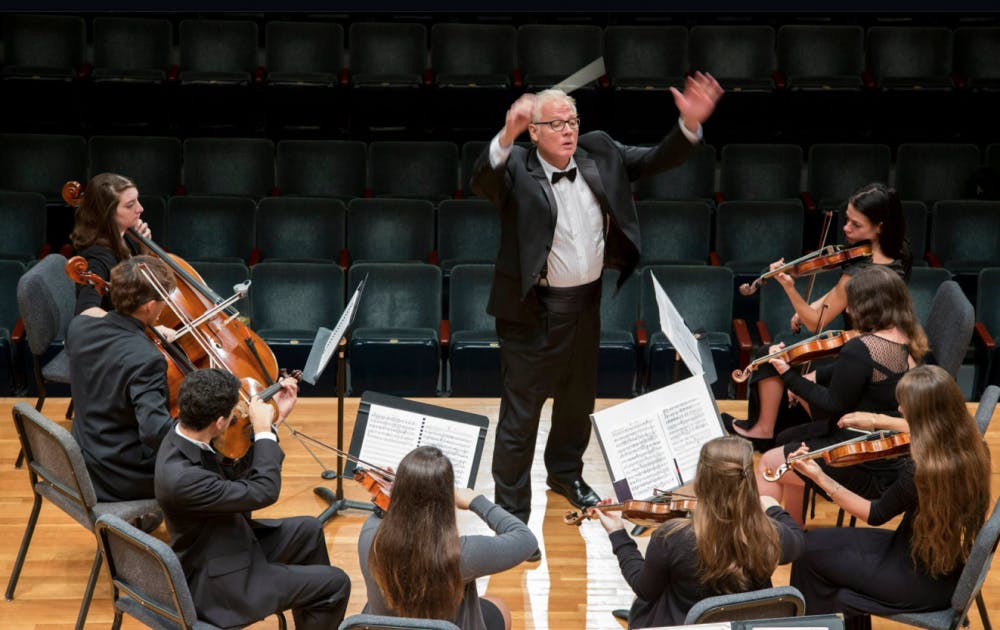By Jillian Festa
Staff Writer
When Harold Levin won a conducting competition during his junior year of college, conducting a movement of a Shostakovich symphony, he knew he had found his lifelong passion.
Levin, a violist, conductor, composer and teacher, has joined the College’s Department of Music as the Conductor of the Orchestra and Adjunct Professor of Viola. His steadfast energy and lighthearted sense of humor made him an instant hit with the members of the orchestra, and as a result, he has brought about an increase in members in the orchestra this semester.
Originally from the Midwest, Levin attended Ball State University, University of Cincinnati and Rutgers University. He has always wanted to be a musician, but it was his years as an undergraduate student that inspired him to become a conductor. Through working on music theory assignments in class, Levin’s affinity with music and composing grew stronger.
It has been 40 years since then and Levin, who started composing as a sophomore, has completed 35 pieces, writing on the side of his teaching and performing career. He said he finds composing to be a completely different experience from conducting in that it is “totally personal.”
A difficulty with composers, Levin says, is trying to pick his favorite.
“My favorite composer is one whose really great piece I happen to be playing or conducting at that minute,” he said.
He does have a group of all-time favorites, however. He loves Wolfgang Amadeus Mozart — listening to his music renders him “practically unconscious.” He also credits J. S. Bach as one of his favorites.
“You revere him because of the idea that somebody wrote that much music that perfectly at some point on earth,” Levin said.
He also admires Joseph Haydn for his string quartet music, but at the same time, he doesn’t exclusively listen to classical music.
“In college, I was listening as much to Led Zeppelin as I was to Mozart,” Levin said.
When he’s not conducting at the College or teaching viola lessons, Levin is going out to restaurants in New York City with his wife, taking care of his four cats, studying scores or planning upcoming orchestra rehearsals.

There has been a large increase in members of the orchestra this semester, which Levin was delighted to announce. When it comes to selecting music for the growing orchestra to play, Levin is like a kid in a candy store. He has to consider the size of the orchestra, take the limited amount of rehearsals into account — they rehearse only once a week — and choose music accordingly.
“What gets to be the challenge is what you can’t do, because you can only do so much,” he said.
He also takes the learning aspect of orchestra into consideration. He views each piece of music as a learning opportunity and aims to expose the orchestra to the many different facets of classical repertoire.
“Undergraduates need a good dose of the standard literature,” Levin said. “We also look at contemporary pieces and baroque string music.”
He plans to take repertoire requests from students in the future, as well.
However, Levin is highly apprehensive about the future of classical music. He believes that two major events are the main causes of classical music’s decline: the 9/11 attacks and the 2008 recession. Both events caused new levels of cuts in attendance and funding.
“The first thing that administrators — who are probably not people in the arts — cut is the art program … This started in the ’70s,” he said.
He notes that the greatest patrons of classical concerts are the people who sang in the chorus or played instruments in high school.
“It’s the people that had public school music programs that are buying tickets and donating to the arts,” Levin said. He recalls from grade school that studying an instrument was just as commonplace as taking a math class.
“You know why I became a musician? Because I couldn’t not be one,” he said.
Levin’s passion for his career and music at large has certainly rubbed off on the members of the orchestra, who are always eager to improve their musical maturity both individually and as members of an ensemble. He firmly believes that by playing a piece you are talking to the composer, which he frequently reminds the orchestra.
“I still get goosebumps when I play a piece by Mozart,” Levin said. “ I don’t know how many people there are like that in the world. My wife laughs at me because she can’t believe the love hasn’t faded … It hasn’t faded at all.”
Levin describes being touched by music as ethereal.
“(Music) is just something you want to hang on to,” he said. “It’s hard to get this amazing, out-of-world experience by doing something for a living … I feel lucky.”







